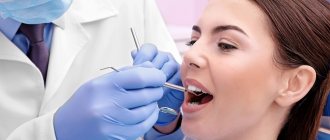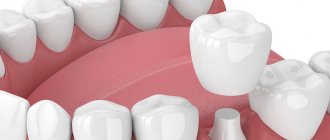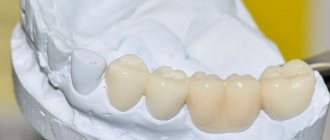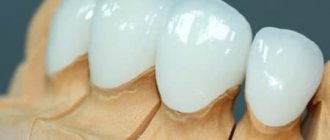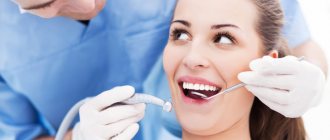Timely detection and treatment of dental diseases is considered a necessary and important condition for maintaining dental health. Even with careful daily oral hygiene, no one can be protected from the development of severe diseases of the teeth and gums, which a preventive examination at the dentist will help identify, because at the initial stage the disease can develop almost asymptomatically.
Experts strongly recommend undergoing a professional examination every six months, even without visible dental problems. Many people are interested in the question: Why exactly after six months? Based on numerous studies, scientists have concluded that this period is optimal for most oral diseases to begin their clinical manifestation. Therefore, they are easy to diagnose and treat because they are in the primary stage of development.
Of course, today the level of dental care is very high, which makes it possible to restore even severely damaged teeth and cope with any ailments of the oral cavity. However, it is better to prevent the disease than to treat it later in a long and tedious manner. Preventive dentistry is designed to recognize pathology in advance and eliminate it as soon as possible.
Activities
A doctor who specializes in dental, jaw and oral health care. This specialization is characterized by a broad concept. As a result, dentists are divided into narrow areas:
- Therapist. The task is to conduct an initial inspection. The key specialization is classical dental treatment. Removal of caries, elimination of inflammatory and infectious diseases in the oral cavity. The goal of the doctor is to diagnose and treat the patient. In some situations, redirect the patient to a specialized specialist.
- Orthopedist. The direction is the elimination of bite deformation and dental prosthetics. Works with cases after trauma.
- Orthodontist. A specialty aimed at working with dental anomalies. Catalysts for the formation of such defects are natural phenomena: genetics, age changes, impairment due to tooth loss, and others. Does not specialize in post-traumatic cases.
- Periodontist. Doctors work with an inflamed oral cavity. Including the mucous membrane, soft tissues surrounding and supporting the teeth. If the case is advanced, then the patient is faced with the most unpleasant thing - periodontal disease. It forms when an infection develops in the space between the gums and teeth. The goal is to restore healthy appearance to teeth. Depending on the situation, medications are used or surgery is performed.
- Surgeon. This direction is associated with the elimination of defects through surgical interventions. In most cases, the doctor specializes in dental implantation and extraction. It is possible to treat inflammation, oral tumors and even minor facial tumors. The mouth is also prepared for prosthetics, problems associated with the trigeminal nerve and salivary glands are eliminated.
- Dental Technician. A lesser known area of dentistry for anyone. This profession does not involve direct patient contact. In rare cases, an appointment is required. This specialization is associated with the direct development and creation of various prostheses from teeth to facial parts, orthodontic and maxillofacial devices. The created prostheses are subsequently installed by dentists.
Who is a dentist, what areas exist are discussed. Who is this profession suitable for?
Mistake number 4
The doctor forgets to sign and discuss the informed consent form.
A young doctor usually believes that if he admits to the patient in advance that the treatment result may not be ideal, this will undermine the patient’s trust in the doctor. In fact, it's exactly the opposite. Anyone can have an instrument break in the canal, anesthesia can result in complications, and when removing upper teeth, a connection with the maxillary sinus can form, and even a piece of the root can fly into the sinus of the most experienced doctor. But! If the patient is warned about this, he will take it calmly. Both he and the doctor will have less stress, and the doctor's reputation will not suffer. And most importantly, the doctor will be able to calmly help the patient.
Who should go to the dentists?
There is no shortage of personnel in this market segment. On the contrary, this is a very in-demand profession. About 2.5 thousand dentists graduate from higher educational institutions every year. In principle, this is relatively little, but this indicator is quite enough to satisfy the demand for dental services.
It is important
The character of the specialist should be calm. Particularly important are balance, diligence, and attentiveness. The dentist must be as careful as possible, because he works with a miniature instrument.
Sociability and ability to pay attention. A qualified specialist must be tactful, regardless of who turned to him for help.
Specialization requires high vision and developed fine motor skills.
Pride of the profession
Every activity has its own stars. Dentistry is no exception. Next, let's look at the most famous female dentists.
Yegana Marufidi
Therapist, periodontist. Yegana works in the direction of aesthetic restoration. Work experience over 20 years. In reviews, clients note the attentiveness of the doctor. They emphasize accuracy in work and a personal approach to each client.
Nadezhda Zholobko
Pediatric dentist providing treatment and prosthetic services. In addition, she deals with cosmetic dental restoration and professional cleaning of the oral cavity.
The doctor notes that it is important to consult a specialist in a timely manner. In the early stages, caries in children can be treated painlessly. Otherwise, the child will face pain and discomfort.
Natela Lomakina
The doctor works in such specialties as therapy, surgical dentistry, restoration and aesthetics. Natela has experience in management activities.
Since the beginning of the 2000s he has been working in Milan. She underwent retraining in dental centers in Italy. Having mastered innovative European-style dental technologies, she became the creator and director of a famous dental center.
Irina Litvin
Maxillofacial surgeon. Despite little work experience, she has established herself as a professional in her path. The key specialization is aesthetic rehabilitation of patients. New works by Irina are constantly published regarding the relationship between the temporomandibular joint and the psychological state.
Important qualities of a dentist
Not everyone can become a dentist. A doctor in our time is not just a profession, it is a calling, so here you need to be a real professional and have a set of important qualities:
• let's start with the fact that a person must have a predisposition to the natural sciences, including physics, chemistry and, of course, biology;
• the dentist must be able to communicate with people and find an approach to even the most difficult characters;
• dexterity, good memory, ability to concentrate and, of course, analyze are essential qualities of a dentist;
• responsibility and patience;
• the ability to respect the fears of patients, the ability to listen and reassure a person;
• neatness and neatness.
Pros and cons of working as a dentist
The advantages include a high salary. Clients are willing to pay for quality work because the appearance is associated with a beautiful, healthy smile.
Getting a medical education is considered a plus; it is useful for everyday life.
Minuses:
- Constant contact with patients, the need to communicate politely regardless of mood.
- Responsibility to clients.
- Education is expensive, getting into university is difficult, especially if we are talking about a budget place.
- It is extremely difficult for an impressionable person to work in this industry. You have to deal with various infectious and inflammatory processes in the oral cavity. The picture is not the most pleasant.
- A wide list of requirements for a specialist.
- Regular training is required.
- Exercise stress.
As for the disadvantages for a female dentist, initially it is constant travel associated with advanced training. Especially when it comes to the mother of a small child. It is also necessary to note physical activity, constant stay on your feet. During pregnancy you have to interact with different people and various diseases. From a physiological point of view, it is difficult to work for those who suffer from severe toxicosis.
The profession of a dentist has pros and cons, to get acquainted with them in detail, watch the video about this specialty:
Is there remote training for dentists?
Yes, there are not only professional retraining, but also advanced training courses for dentists. In the centers of additional professional education, training is available only to those who have completed an internship or residency in the specialties of dentistry and general dentistry.
The course can be available in full-time and distance learning. As in the case of retraining, upon completion of the advanced training course, a state-issued certificate is issued. The organization offering such courses must have a license to conduct educational activities, in which case the document will have legal force and will be accepted by the organization.
Author of the article
Nikita Dobrynin
Acquiring skills
- Conduct an examination and diagnose the disease.
- Ability to analyze a situation in order to develop a treatment plan in the future.
- Read the x-ray.
- In certain cases, recommend possible solutions to the problem and encourage the patient to make the right choice.
- Describe in detail the rules of oral hygiene and, in general, how to care for your teeth and gums.
Link to the professional standard: https://www.przrf.ru/docs/full/kadrovoe_regulirovanie1/Ob-utverzhdenii-professionalnogo-standarta-Vrach-stomatolog/
You will have to work with different dental instruments and special equipment. Also with medications. Some areas even require computer skills. When it comes to prosthetics, modern doctors create mock-ups in special programs and then print them on 3D printers.
Initially, the newcomer will be faced with the need to work in practice with a supervisor. In the future, doctors can work with assistants who carry out assignments (preparing instruments, recording clients).
Labor operations:
- Preparatory stage: turning on the equipment, arranging medications if there is no assistant.
- Patient reception, examination.
- Prevention, diagnosis.
- Treatment of problem teeth or oral cavity.
- Taking impressions.
- Anesthesia if removal of a tooth, nerve, etc. is required.
- Paperwork.
What knowledge is needed at work?
A dentist must have excellent knowledge of his subject. Combined with good interpersonal skills.
Needed:
- Knowledge of medicine and interest in science, especially oral health science.
- Possibility of using special equipment.
- Ability to convey hygiene and treatment information to clients in a clear, concise manner.
- Willingness and ability to communicate with different people.
- Resistance to stress and ability to cope with restless, difficult patients.
- The ability to inspire trust and establish trusting contact with the patient.
- Good leadership qualities, ability to work as part of a team.
- Business knowledge to enter private practice.
Development of professionals
In most cases, it all starts with practice from the university. The student acts as an assistant. In some situations, dentists begin to see patients immediately, without practice.
There are two scenarios for the development of events: horizontal and vertical. The more experience and higher qualifications, the faster the prestige and number of clients grow.
Starting as a practicing physician, you can later take the place of head of department, deputy head physician and the post of chief physician.
The second option is scientific detail. After finishing your internship, you can enroll in graduate school. Then defend your dissertation, candidate's and doctoral dissertation. As a result, you can create your own school and make original developments.
As for advanced training. It is impossible to work in this industry without this. Most often, doctors in this field undergo retraining in state educational institutions. Depending on the direction, this could be a university, academy or other centers.
- Universities contribute as much as possible to advanced training. Most universities have faculties and courses in various areas of dentistry.
- There are also commercial centers and clinics where you can improve your skill level.
- To improve your knowledge, you can take advantage of seminars and lectures created by the Association of Dentists.
- Courses for dentists in Moscow are popular, and this also applies to trainings conducted in educational institutions.
note
There are specialists who prefer to expand their knowledge via the Internet. Webinars and additional online courses will allow you to receive a certificate while sitting in front of a PC monitor.
International confirmation of professionalism in this area is real. This requires knowledge of a foreign language. If you choose a scientific career, writing articles, books and other literature requires a thorough knowledge of the English language. If you intend to practice at foreign universities, your knowledge of a foreign language must be at the highest level.
You can work:
- In clinics.
- Public and private dental clinics.
- In children's institutions where there is an equipped dental office.
- Camps.
- Sanatoriums.
- Universities, academies.
Study, courses and demand
Every dentist has a long and thorny career path. It all starts in one of the most difficult educational institutions - medical school. A diploma issued at the end of school does not guarantee admission to a government-funded place. Therefore, most modern specialists graduate from paid departments of medical universities. On average in Russia, studying at a medical university costs about 300 thousand per year, and this is not the highest price. The training lasts for five years, then specialists undergo residency for two years to gain experience and develop in a certain specialization. Only after this can the doctor begin to work fully.
And it would seem that the training is over. But not in medicine, since with the development of modern technologies and the improvement of materials, approaches to dental treatment also change. Therefore, a dentist must annually attend various seminars, courses and lectures to improve his knowledge and exchange valuable experience with colleagues.
Now let's talk about salary. The payment a dentist receives depends on several factors: the doctor’s experience, his place of work, and the complexity of the treatment performed. It's no secret that dentists in private clinics earn much more than their colleagues from public dentistry. However, getting into a well-known clinic with a large flow of patients is not at all easy due to high competition. In Russia, on average, a dentist earns about 70 thousand rubles, but doctors always have a chance to earn more.
Don't forget about advanced training. According to Russian legislation, dentists must improve their qualifications every five years. This can be done by attending medical conferences and courses, which we talked about earlier.
Photo from the personal archive of Elena Bobkova /
How much do dentists earn and what does it depend on?
Salary of specialists:
- Moscow: 35 thousand - 150 thousand rubles.
- Russia: 30 thousand - 120 thousand rubles.
Now regarding the level of specialists abroad:
- Germany: regular dentist 4.5 thousand euros, prosthetist 2.5 thousand euros.
- USA: average salary per year is 158 thousand dollars. Hourly rates from $76 for 60 minutes.
- Canada, let's take hourly wages in Vancouver as an example: minimum $35, average $65, maximum $100.
To understand which types of dentists are considered the most valuable, watch the video:
How much does a dentist earn in Western countries?
USA
In the US, most dentists have their own private practice, for which they need to obtain a license. The salary level is up to $80 per hour and up to 140 thousand dollars per year - this is a whole industry here.
Germany
In Germany, a dentist can earn up to 6,000 euros per month, and this is before taxes. However, this mainly applies only to experienced specialists, and beginners receive up to 3,500 euros. In East Germany, income levels are much lower; here, even an experienced doctor can only earn 4,500 euros. In England, a dental therapist earns at least 7.5 pounds per hour. The annual income of such a specialist is 97-98 thousand pounds.
Canada
Where and how many years do you need to study to become a dentist?
It is mandatory to obtain a higher education. You can get a dentist's diploma in any regional center of the Russian Federation. Duration of training is from 7 to 8 years.
The most prestigious are:
- Moscow State Medical and Dental University named after. A. I. Evdokimova. Therapy, surgery, orthopedics. 400 thousand for 1 academic year.
- St. Petersburg GPU. 220 thousand rubles for 1 year.
- North-Eastern Federal University named after M.K. Ammosova. The following areas are represented here: therapy, orthopedics, surgery, children's and others. Tuition price starts from 220 thousand rubles per year.
